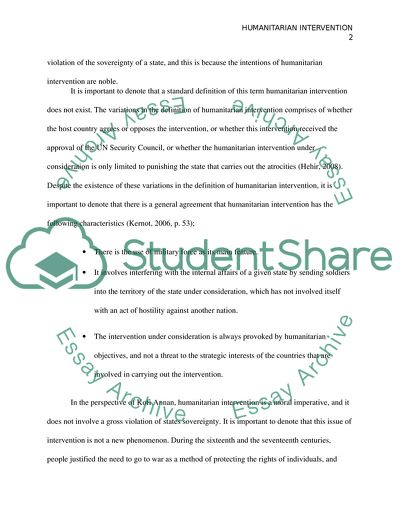Cite this document
(Humanitarian Intervention: Ethical, Legal, and Political Dilemmas Literature review Example | Topics and Well Written Essays - 2250 words, n.d.)
Humanitarian Intervention: Ethical, Legal, and Political Dilemmas Literature review Example | Topics and Well Written Essays - 2250 words. https://studentshare.org/sociology/1811739-in-1999-the-then-un-secretary-general-kofi-annan-asked-if-humanitarian-intervention-is-indeed-an-unacceptable-assault-on-sovereignty-how-should-we-respond-to-a-rwanda-to-a-srebrenica-to-gross-and-systematic-violations-of-human-rights-that-a
Humanitarian Intervention: Ethical, Legal, and Political Dilemmas Literature review Example | Topics and Well Written Essays - 2250 words. https://studentshare.org/sociology/1811739-in-1999-the-then-un-secretary-general-kofi-annan-asked-if-humanitarian-intervention-is-indeed-an-unacceptable-assault-on-sovereignty-how-should-we-respond-to-a-rwanda-to-a-srebrenica-to-gross-and-systematic-violations-of-human-rights-that-a
(Humanitarian Intervention: Ethical, Legal, and Political Dilemmas Literature Review Example | Topics and Well Written Essays - 2250 Words)
Humanitarian Intervention: Ethical, Legal, and Political Dilemmas Literature Review Example | Topics and Well Written Essays - 2250 Words. https://studentshare.org/sociology/1811739-in-1999-the-then-un-secretary-general-kofi-annan-asked-if-humanitarian-intervention-is-indeed-an-unacceptable-assault-on-sovereignty-how-should-we-respond-to-a-rwanda-to-a-srebrenica-to-gross-and-systematic-violations-of-human-rights-that-a.
Humanitarian Intervention: Ethical, Legal, and Political Dilemmas Literature Review Example | Topics and Well Written Essays - 2250 Words. https://studentshare.org/sociology/1811739-in-1999-the-then-un-secretary-general-kofi-annan-asked-if-humanitarian-intervention-is-indeed-an-unacceptable-assault-on-sovereignty-how-should-we-respond-to-a-rwanda-to-a-srebrenica-to-gross-and-systematic-violations-of-human-rights-that-a.
“Humanitarian Intervention: Ethical, Legal, and Political Dilemmas Literature Review Example | Topics and Well Written Essays - 2250 Words”. https://studentshare.org/sociology/1811739-in-1999-the-then-un-secretary-general-kofi-annan-asked-if-humanitarian-intervention-is-indeed-an-unacceptable-assault-on-sovereignty-how-should-we-respond-to-a-rwanda-to-a-srebrenica-to-gross-and-systematic-violations-of-human-rights-that-a.


